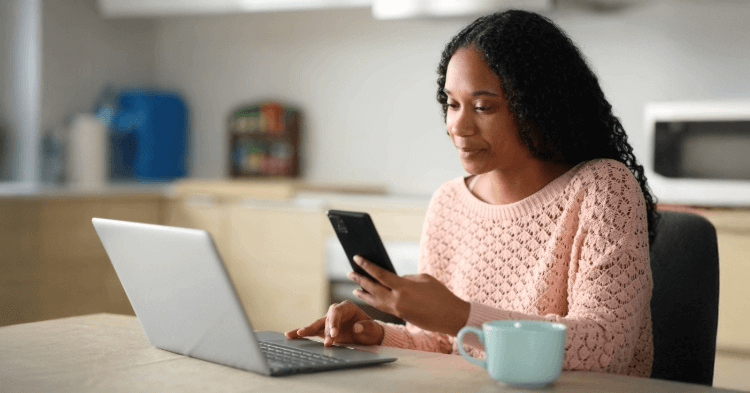Life doesn’t always go according to plan. A sudden bill, car trouble or an unexpected expense can throw your budget off track. If you don’t have savings to cover the cost, you may find yourself looking at ways to borrow money. This can sometimes feel overwhelming. There are so many options out there and it can be hard to know which is right for you.
One common option many people turn to is an unsecured personal loan. These types of loans can be a good fit for many different financial situations. Understanding what an unsecured loan is, how it works and the pros and cons can help you decide if it’s the right choice for you.
What is an unsecured personal loan?
An unsecured personal loan refers to a type of loan that doesn’t require collateral for approval. Unlike a secured loan, which is backed by an asset (like an auto loan secured by your car), unsecured loans rely on your creditworthiness. Lenders will typically look at your credit score, monthly income and debt-to-income ratio (DTI) to determine if you qualify.
What types of loans are considered unsecured personal loans?
Personal installment loans. With a personal installment loan, you borrow a set loan amount upfront and repay it over a fixed period of time through regular bi-weekly or monthly payments. These loans usually have a fixed interest rate, so your payment stays the same each month. Borrowers often use installment loans for home improvements or unexpected expenses because the structured repayment plan can make fitting it into your budget easier.
Personal lines of credit. A personal line of credit gives you flexible access to funds as you need them. Unlike an installment loan which provides you with a lump sum upfront, if you’re approved for a line of credit you’ll be given a credit limit that you can borrow from. As you repay, your available balance goes back up and you can borrow from it again. Line of credit can be useful for ongoing or unpredictable costs.
Debt consolidation loans. A debt consolidation loan is designed to roll multiple higher interest rate debts into a single loan. This can help you simplify your finances and save money on interest.
Student loans. Most federal student loans are unsecured. Eligibility typically relies on factors like enrollment status and financial needs. These loans can help cover tuition, books and other education related costs.
What can you use an unsecured personal loan for?
You can use an unsecured personal loan for many purposes, such as:
- Debt consolidation. You may be able to roll your high interest debts, such as credit card debt, into one loan with a lower interest rate and predictable repayment plan. This can help you save on interest and pay off your debt faster.
- Home improvement. Cover the costs of repairs and renovations your space needs and pay it off gradually.
- Unexpected expenses. Emergency bills, car repairs and medical costs can be expensive. A personal loan can help you take care of what you need to with less stress.
- Big purchases. If you’re moving, need new furniture, a new appliance or have another large expense an unsecured personal loan can help you cover the expense and allows you to pay it off slowly.
Pros and cons of unsecured personal loans
Pros
No collateral required. Unsecured loans don’t require you to provide collateral. This means the lender won’t automatically seize your asset in the event that you’re unable to repay.
Predictable payments. With unsecured installment loans, you’ll typically receive a fixed payment schedule so you’ll always know what your loan payments will be. This can make it easier to budget for.
Build credit history. If your chosen lender reports to the credit bureaus, your on-time payments can help you build your credit history.
Cons
Higher interest rates. Unsecured loans may have higher interest rates than a secured loan. Since there is no collateral securing the loan many lenders charge more to offset the risk.
Eligibility requirements. Traditional lenders like banks and credit unions may have strict loan requirements. However, it is possible to find online lenders who may be able to approve those who have been turned down elsewhere.
Higher debt-to-income ratio. When you borrow money, you’ll normally increase your debt-to-income ratio, which can have a negative effect on your overall creditworthiness.
Is it hard to get an unsecured personal loan?
Getting approved for an unsecured loan is easier if you have good credit — but that doesn’t mean it’s impossible to get a loan with bad credit. Here is what lenders typically look at when considering a loan application:
- Credit score or FICO score. Higher scores can usually help you unlock better loan rates, but some online lenders consider applicants with fair or even poor credit.
- Monthly income. Lenders want to make sure that you earn enough to cover your loan payments. This can include evaluating other debts as well.
- Credit report. Lenders may look at your full credit report to see your payment history.
Even if your credit isn’t where you’d like it to be, you still have options. Online lenders often consider more than just your score. Be aware that if you have bad credit, you may face higher interest rates, smaller loan amounts and less favorable loan terms. However, if you’re in need of emergency cash they can be a good option.
Where to get an unsecured personal loan?
Traditional lenders. Traditional lenders like banks and credit unions can offer unsecured personal loans. While these types of loans can have good rates and favorable terms they can be more difficult to qualify for as many traditional lenders have strict eligibility requirements. Funding and approval can also take longer than some online lenders.
Online lenders. Online lenders may also offer unsecured personal loans. Their application process is typically fast, and you could receive funds by the next business day or sooner. They also often have less strict requirements — meaning you could be approved even if you were turned down elsewhere. Keep in mind that you’ll likely be paying higher interest rates and your terms may not be as favorable. While these types of lenders can provide quick cash, you may want to consider other options before you apply.
Final Thoughts
Unsecured personal loans can be a helpful tool when you need to borrow money for expenses like debt consolidation, home improvements or unexpected bills. Because they don’t require collateral, they carry higher interest rates and depend heavily on your creditworthiness. Before signing a loan agreement, review your credit report, compare loan offers and make sure the monthly payment fits your budget.
DISCLAIMER: This content is for informational purposes only and should not be considered financial, investment, tax or legal advice.






